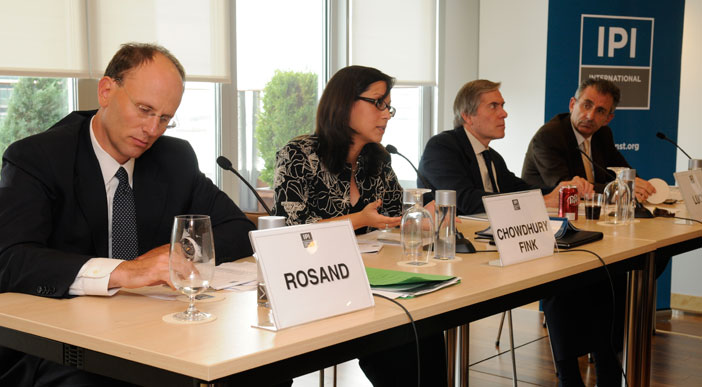
On September 10, 2009, IPI hosted a policy forum on terrorism with Jean-Paul Laborde, Special Adviser to the Under-Secretary-General, who discussed ongoing efforts to implement the UN’s Global Counter-Terrorism Strategy.
Mr. Laborde was joined by panelists Eric Rosand, Co-Director of the Center on Global Counterterrorism Cooperation, and Naureen Chowdhury Fink, Senior Policy Analyst at IPI.
Mr. Laborde opened his presentation by asking whether it is necessary to have a “strategy to implement the Strategy,” referring to the UN’s Global Counter-Terrorism Strategy, which was adopted by a General Assembly resolution in 2006. This strategy promotes a more comprehensive approach to countering global terrorism that acknowledges the importance of “conditions conducive to the spread of terrorism,” and reaffirms the importance of human rights and the rule of law, in addition to developing states’ capacities for countering terrorism. The Counter-Terrorism Implementation Task Force (CTITF) is tasked with coordinating the efforts of the UN system to implement the Strategy..
Mr. Laborde noted that the 2006 resolution is a political document in need of actualization, and that the UN has a number of assets that the CTITF could draw upon in this effort. Consequently, he noted that the CTITF –– comprised of twenty-four members including UN departments, agencies, and programs, as well as partners like the IAEA and the World Bank –– is in a unique position to help coordinate efforts focusing on the “conditions conducive” to terrorism and the promotion of the rule of law and human rights (pillars one and four of the Strategy).
He also observed that a lot of excellent work focusing on technical assistance and capacity building (pillars two and three) has been undertaken by the UN Counter-Terrorism Executive Directorate (CTED) and the UN Office on Drugs and Crime (UNODC). Mr. Laborde noted, however, that it is essential for the CTITF to be institutionalized within the UN system in order for it to undertake the tasks it was assigned, to assist member states in implementing the Strategy, and to contribute to a more holistic institutional approach to addressing peace and security challenges.
During his comments, panelist Eric Rosand emphasized that efforts to counter the global terrorist threat were undertaken primarily along bilateral or trilateral channels, and that the UN should not seek to be the locus of this activity. Nonetheless, he noted that the UN has a very important role to play given the legitimacy derived from its membership and its convening capacity. He remarked that more has been done on terrorism at the UN since September 11, 2001, than has been done on most other areas, and that the shortcomings of the system should not cloud the positive strides made by the world body and its members to address the threat. However, Mr. Rosand noted, a number of challenges remain, including the need to consolidate the UN’s counterterrorism efforts into a centralized “hub” or “nerve center.”
Naureen Chowdhury Fink, lead rapporteur of IPI’s Blue Paper on Global Terrorism, also noted the importance of bilateral and “plurilateral” initiatives, but observed that the increasingly transnational and multifaceted nature of the threat warranted a global and multilateral response. Ms. Fink said that countering terrorism should be recognized analytically, institutionally, and operationally as being linked to a broad set of security threats that jeopardize international peace and security, and threaten the development prospects of many countries. However, she noted, the UN’s response has been hampered by unwieldy institutional arrangements, inconsistent political support, and a lack of public understanding of the UN’s role and comparative advantages in addressing terrorism.
Drawing on a year-long IPI Task Force process, Ms. Fink presented four key ideas to strengthen multilateral capacity in this field, as well as a series of recommendations to help achieve them: (1) strengthening political support for the UN’s role in countering terrorism; (2) enhancing strategic communications; (3) deepening relationships between UN headquarters and national and regional partners; and (4) streamlining the UN’s counterterrorism architecture. However, in order to give the UN the tools necessary to meet member-state expectations and demands, Ms. Fink said, it is vital for the UN’s counterterrorism efforts to receive the necessary resources, funding, and political authority to effectively perform their designated tasks.
The discussion was moderated by Dr. Edward C. Luck, IPI Senior Vice President and Director of Studies.







